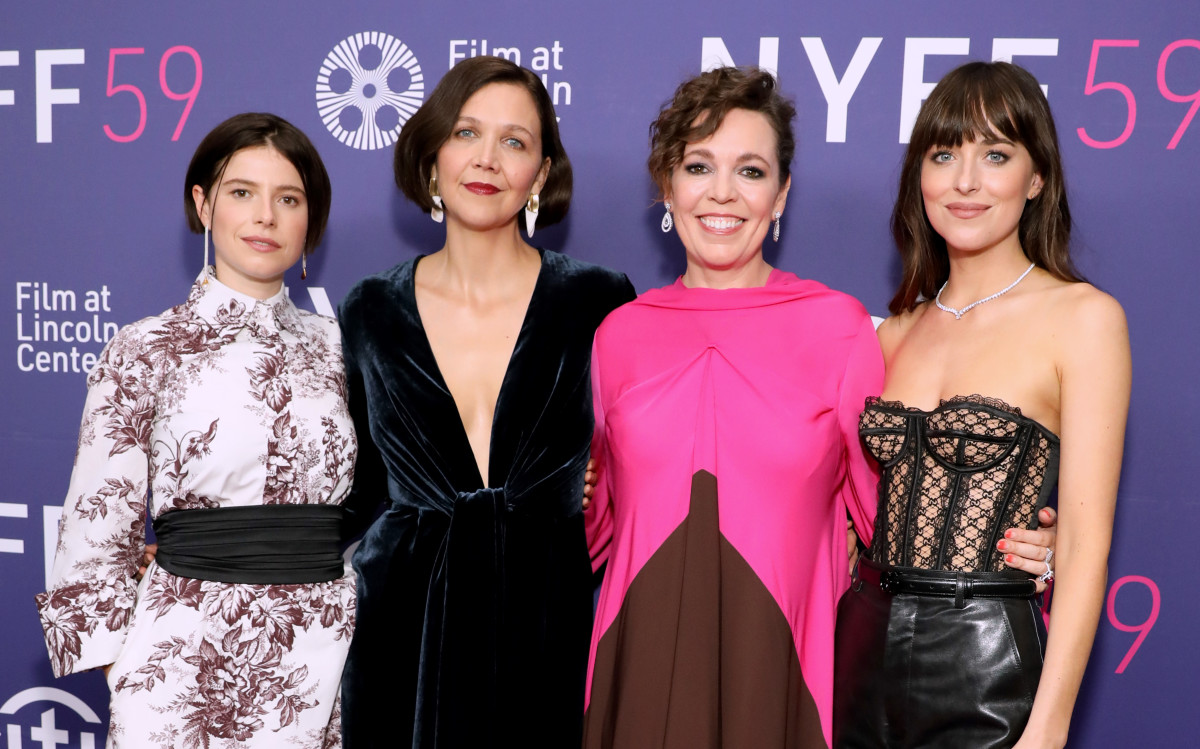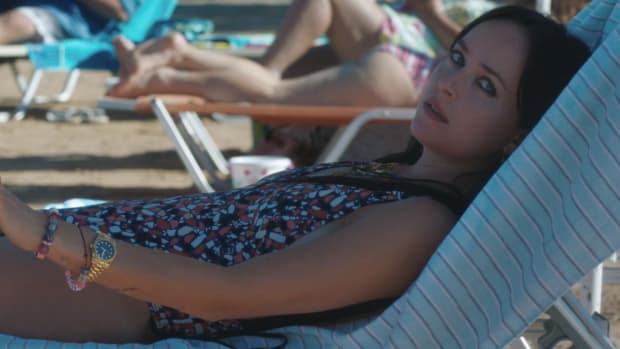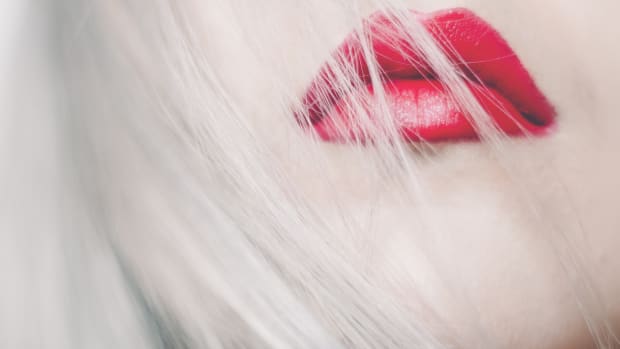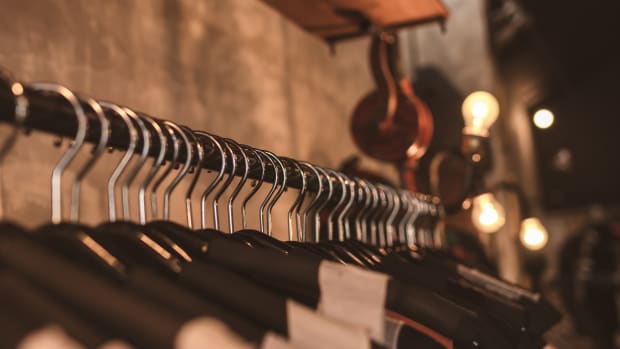Warning: Spoilers for 'The Lost Daughter' below.
Maggie Gyllenhaal's critically-acclaimed directorial debut, "The Lost Daughter," explores, often viscerally, the intense emotions that women — especially mothers — experience in a powerful, empathetic and
refreshingly non-judgmental way. As the slow-burn psychological drama unfolds, feelings that women rarely, if ever, are allowed to voice, or even admit to themselves, are laid bare.
Behind-the-scenes, Gyllenhaal also created a protected way for the lead actors, Dakota Johnson and Olivia Colman to reveal themselves through their characters, craft and costumes. During an AFI panel, Johnson, who plays Nina, an overwhelmed young mother summering with family on an idyllic Greek island, discussed the experience: "A lot of the movie takes place on the beach and I never worried about what my body looked like. None of the women did. That was [expletive] cool."
From a costume perspective, the production was a safe space, from the initial collaborative discussions with the cast and director, to the fittings, which involved strict pandemic protocols in Greece. "Because it's Maggie, everything was talked about properly," says Edward K. Gibbon, over Zoom.

Jessie Buckley, Maggie Gyllenhaal, Olivia Colman and Dakota Johnson at the premiere screening of 'The Lost Daughter.'
Photo: Monica Schipper/Courtesy of Netflix
The British costume designer previously collaborated with Gyllenhaal in the 2014 miniseries "The Honourable Woman," in which her character Nessa Stein sublimely power-dressed in vintage Chanel, silky panic-room-ready underthings by Carine Gilson and an incredibly chic white Topshop pantsuit.
"We obviously have a shared language, in a way, about clothes and style," says Gibbon. The two stayed in touch, and when he heard that Gyllenhaal had the project in the works, he jumped at the chance: "I actually wrote to her, saying I wanted to do it."
As a first-time director, Gyllenhaal (who also wrote the script based on Elena Ferrante's novel) applied her own experiences in front of the camera. "She knew how important that was for the actors to feel comfortable," says Gibbon, recalling her process. "'As long as they're happy. As long as they have comfortable shoes. That's really important, because I've been given some uncomfortable shoes.'"
The pandemic turned in-person brainstorms into virtual Zoom discussions "batting images" back and forth from across the Atlantic to devise the film's ultimate costume vision. "It's rooted in reality, and it's not high fashion or anything, but at the same time, she wanted it to be slightly stylized," Gibbon says.

Nina (Dakota Johnson) and Leda (Olivia Colman) have a crisis on the beach.
Photo: Yannis Drakoulidis/Courtesy of Netflix
Also thanks to Covid, the film switched locations from New Jersey to Greece, and Gibbon continued to prep virtually with the leads. "Dakota, I think she was at Gwyneth Paltrow's house," he says. Gibbon held frequent "quite quick" conversations with U.K.-based Colman, who plays an enigmatic British professor with two grown daughters, vacationing solo from New England. (Jessie Buckley plays 20-something Leda in illuminating flashbacks revealing the character's past decisions and intentions with Nina.)
Inspired by Monica Vitti's "iconic" sweater in "L'Avventura," Gyllenhaal envisioned a strong signature through current-day Leda's Greek vacation wardrobe. "They're very distinct shapes. They're very distinct silhouettes, but they're not scream-out-loud clothes," Gibbons says. "Very much, we wanted to get that kind of simplicity."
Evoking "a classic seaside holiday," he gave Leda a "very neutral palette" on '50s and '60s-inspired silhouettes with minimal patterns and devoid of embellishments. For her array of sarongs and cover-ups, he looked to Max Mara and Greek-label Parthenis, plus custom-made pieces — "trying to give it that timelessness," Gibbon says. (Leda's bespoke white skirt-suit and blouse, which bookends the film, contains flashback Easter Eggs, referencing "Leda and the Swan" and her daughters' white dresses.)
Leda first wanders onto a deserted beach and contentedly sets up her spot, while wearing a crisp white and eyelet-detailed cover-up by BFC/Vogue Designer Fashion Fund recipients palmer//harding (above). "It's elegant. It looked really beautiful and, when the sun shone through [the eyelet detail], it just felt almost serene about her," says Gibbon. "We wanted it to feel very calm at the beginning. That she was in this kind of controlled situation. She was in control."
Enjoying an ice cream cone, Leda's tranquil solitude is interrupted by the arrival of Nina and her raucous family — from Queens, not Naples, as in the book. Leda is immediately intrigued by the American and her demanding four-year-old, Elena (Athena Martin Anderson), perhaps because Leda sees a bit of herself within the charged mother-daughter dynamic. Leda then attracts the ire of Nina's somewhat-threatening in-laws by not relinquishing her beach chair for their birthday celebration. After finding a lost Elena, Leda later ingratiates herself with Nina. But during the hubbub, Elena's beloved doll goes missing, sending the two women, at their different stages of motherhood, into a spiral in confronting their own feelings and each other.
Leda slowly begins losing control, while exposing more to herself and possibly Nina. She wanders into a boisterous party in town, while noshing on a gyro (which, unrelated, looks absolutely divine). Her bright magenta pink — and almost ominously red — wrap-dress by Max Mara (above) foreshadows a silent showdown to come.
"I had an image of Miuccia Prada on the runway, after a show, wearing a silk dress in that shade on my original boards for Leda," says Gibbon. "I love the way we see Leda wearing that dress and eating a souvlaki in the street. A casual glamour."
Recommended Articles
Observing the lively crowd, Leda reluctantly accepts caretaker Lyle (Ed Harris)'s invitation to dance and immediately surrenders to the euphoric party anthem that is Bon Jovi's "Livin' on a Prayer." The dress's vibrant color and sheen enhance the pure sweaty, unrestrained moment, as Leda waves her arms in the air and belts out the karaoke favorite. (Due to Covid protocols, crew members in the production bubble doubled as extras, including Gibbon, who's delightfully dancing about in the background.)
Leda's series of sweetheart-neckline and wide-strap maillot remain her consistent throughout the movie. "She was very elegant, very functional and stripped-back," says Gibbon about the one-pieces by Wolford, Marks & Spencer and Michael Kors. "It's so easy to be distracting with too much, that it felt like really pulling back with her, all the time. Just going as simple and as blocky, almost, as possible, and then you've got the amazing contrast with Dakota, wearing a piece of floss." The swimwear also connects the two mothers: "I like your bathing suit," says Nina, after Leda returns Elena to her.
Johnson enthusiastically shared her vision for Nina with Gibbon. "Dakota was straightaway just Googling images," he says, remembering her immediately pulling up Emily Ratajkowski's swimwear line, Inamorata. "She was like, 'You know, fuck it! I should just be wearing these. That's the character. That's who she is.'" (Gibbon sourced an ultra-strappy bikini set from the line, and cut-out and wildly patterned styles from Greek label PCP.)
Nina's skimpier, frenetically-patterned swimsuits — haphazardly worn with hoodies, hot pink flip-flops and copious amounts of gold jewelry — could be illustrating a societal difference between the possibly organized crime-connected Nina (as insinuated by the script and the book) and Cambridge academic Leda, who did come from modest means. But Nina's more unconstrained, showy style also expresses her way of being in command of herself, while her overbearing in-laws and sketchy husband Toni (Oliver Jackson-Cohen) regulate her life.
"It's a celebration, again, in contrast with who Leda is and who Leda is trying not to be, as well, all the time and trying to be in control," says Gibbon. "That's what Nina represents to [Leda], sometimes, this is freedom to be to be that."
Her accessories subtly touch on the "how a mother should dress" narrative, but in a more practical sense, while also offering a connection in how Nina and Leda grapple with the pressures of motherhood. "Even wearing the jewelry on the beach, it was good to have that slightly inappropriateness, that doesn't feel like what a mother would do because the child might catch their hair on her jewelry or something like that," Gibbon says. "So we thought of that: a slight, not irresponsibility, but a kind of self-interest, rather than about your child."
Gibbon originally had a more "stylized vision" for Nina's off-the-beach attire, but then realized a "put-together" look didn't quite work for her. "We soon realized that was just too much and she didn't need it," he says. "It was nice that she'd just pull on the sweatpants [over her swimsuit]. There had to be a a really nice casualness to it." Plus, a young mother overwhelmed by a relentlessly clingy child, largely absentee spouse and hovering in-laws wouldn't have much time or energy for it, so Nina randomly throws Toni's brash tiger print Mango shirt over a pink crop top and biker shorts set by PCP for a toy store run to find a replacement doll for an inconsolable Elena.
Nina's mix-and-match looks also include an oversize acid-wash jean jacket and crop top with a yellow, zipper-detailed leather miniskirt by Alexander McQueen (from Athens-based Mo Vintage) to glare threateningly at Leda at the dance party. Gibbon found most of her gold jewelry from H&M and "some brilliant tacky shops in Athens."
At one point, Toni gives Nina an almost-comically oversized beach hat (top), which also serves as a plot-driver leading to Leda's perplexing confession to Nina. "You won't believe how many hats I went through to get to that one," says Gibbon, who ultimately found the perfect wide-brim one from Max Mara. "Essentially, it's a controlling thing, isn't it? It's like Toni trying to dress her up as a little doll. So [wearing the hat] had to feel awkward all the time. It had to feel weird, but then have practicalness, as well."
The hat also illustrates Nina's level of control in what she's revealing to herself and her family, or not — "that slight duplicitous of her character, who's almost hiding." Because Nina is also sneaking around with cute beach attendant Will, played by "Normal People" co-star Paul Mescal.
The steamy limited series premiered just as "The Lost Daughter" began production, and Mescal (and his character Connell's gold chain) became breakout heartthrobs. "I got all these bits of leather [necklaces] with shells and offered them up to him and he was straight away, like 'No,'" says Gibbon, with a laugh.
Despite Mescal's Internet thirst potential, Gyllenhaal didn't cast him as "that person" (and Will's short-shorts by Dirty Laundry just worked for the character, who charms both Nina and Leda.) "So throughout the whole film, he never takes his T-shirt off, even though he's the lifeguard, and [Gyllenhaal] was very much like, 'No, I don't want him like that," says Gibbon. "Again, not judging and not objectifying people was very important."
'The Lost Daughter' streams on Netflix on Friday, Dec. 31.
Never miss the latest fashion industry news. Sign up for the Fashionista daily newsletter.











